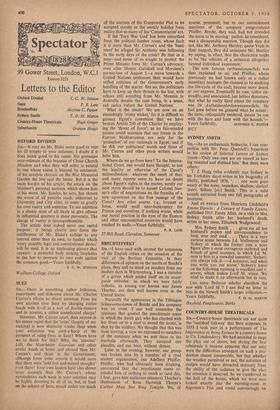SUEZ
SIR,—There is something rather ludicrous, impertinent and dishonest about Mr. Charles Curran's efforts to divert attention from his own atavism over Suez by charging cooler heads with it—if at a sort of double-remove and in reverse; a rather complicated charge!
However, Mr. Curran apart, does anyone in his senses regret that the 'crisis' (largely of our making) is now distinctly cooler than when your columnist was cock-a-hoop at the prospect of using force in Suez? Whom have we to thank for this? Why, the 'atavistic' Left, the Manchester Guardian and other cooler heads at home and abroad than Mr. Curran's and those in the Government; although from some reports it would seem that there were 'cold feet and second thoughts' even there! Your own leaders have also shown wiser counsels than Mr. Curran's, whose pyrotechnics each week in your columns may be highly diverting to all of us, but, at least on the subject of Suez, smack rather too much of the atavism of the Gunpowder Plot to be accepted merely as the weekly holiday from reality that so many of his 'Commentaries' arc.
If the 'Tory War God' has been unearthed from the political lumber room, whose fault it is more than Mr. Curran's and the 'basic tenet' he alleged Sir Anthony was following in the early days of the crisis? Be that as it may—and some of us sought to protect the Prime Minister from Mr. Curran's advocacy, even after Messrs. Gaitskell and Morrison's me-too-ism of August 2—a move towards a United Nations settlement then would have stifled criticism of the Government's early handling of the matter. But no, the politicians have to keep up their threats to the last, with echoes still sounding from Mr. Menzies in Australia despite the case being, in a sense, sub judice before the United Nations.
What is the result? We are now on an exceedingly 'sticky wicket,' for it is difficult to gainsay Egypt's contention that we have broken Article 2(4) of the Charter by employ- ing the 'threat of force'; as no fair-minded person could maintain that our forces in the Eastern Mediterranean are only for the 'protection' of our nationals in Egypt; and if he did, our politicians' words and those of Mr. Curran and other press writers would belie him.
Where do we go from here? To the Interna- tional Court, one would have thought, to test the legality or otherwise of the Canal's nationalisation: whatever the result of that, and many experts seem to have no doubt about Egypt's rights in the matter, surely our next move should he to accept Colonel Nas- ser's offer of negotiations on the framing of a new agreement on the free passage of the Canal? Any other course, e.g., boycott or force, would spell near-bankruptcy for France and ourselves, if nothing worse, while our moral position in the eyes of the Eastern and other uncommitted countries would have reached its nadir.—Yours faithfully,


















































 Previous page
Previous page